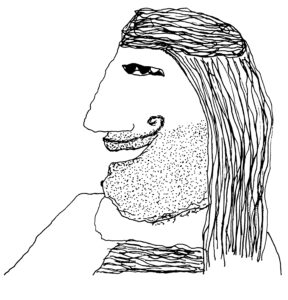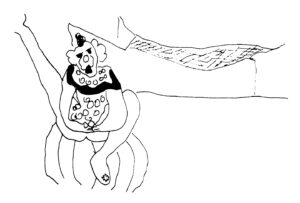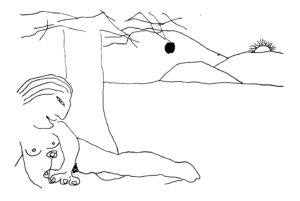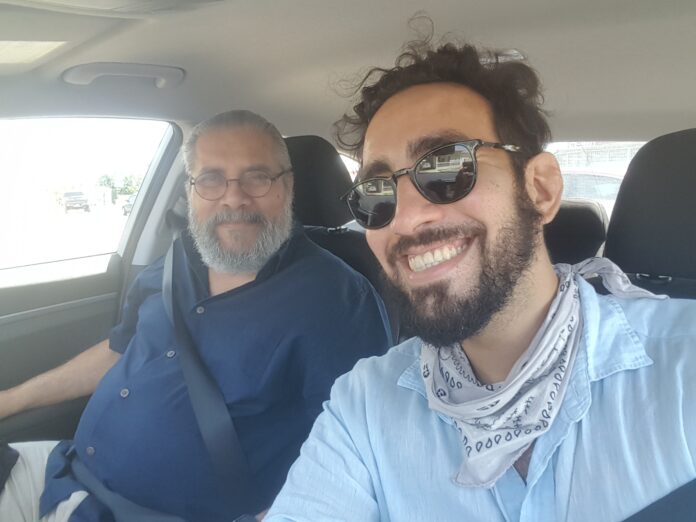By Gustavo Rivera
There is a sliver of truth when Josefina Rivera de Álvarez, in her book Literatura Puertorriquena: Su proceso en el tiempo (Puerto Rican Literature: Its Process Through Time), mentions the similarities in form between Villanueva’s debut collection and the minimalist linguistic artifacts of Nicanor Parra, considered by many as one of the most influential modern poets who wrote in the Spanish language. Don Villanueva is much more than just the premiere Anti-Poet of the country. While it’s needless to state that Villanueva was influenced by Poemas y Antipoemas (1954), there is some misinterpretation on how Villanueva was influenced. The initial flaw lies in a narrow focus on the extraordinary new form and vocabulary, abrasively diverging from the status quo of poetry on the island at the time, tending to rely on traditional Spanish forms with explicit nationalist themes. There lacks an understanding that what guided these poems wasn’t merely new forms but also new rhetorics, principles originating before Parra’s Anti-Poetry, part of the revolutionary spirit of the avant-garde artist. Other discussions of Villanueva’s work, of the little that can be found, focuses on the undeniable internal perspective of the voice in his poetry but seems to confuse point-of-view for apoliticization. Actual time spent with the man and his work proves the opposite: Villanueva was, and remains, as political as one could get, regardless of what he is doing with his craft. Apart from the island’s political dilemma, he also saw in our personal relation, specifically people’s sense of elitism and entitlement, another cause of the island’s social mores. It is this acute focus, resulting in poems which appear as abstract aphorisms, freely applicable to always hold a certain truth, which demonstrates the revolution in Villanueva’s work.
Parra presented the language produced by our modern lives, the most common objects – language arising from telephones, soda fountains, park benches, even street signs – as a source of poetry, allowing the material to speak for itself. Doing so, his pieces maintain a particular order but as a whole do not coincide stylistically, ironically giving his work another coherence: the accord to live absurdly, a message on modern life Villanueva recognized and applied to his understanding of life in Puerto Rico. Live Wire Poem is the product of this endeavor. The avant-garde poet, fundamentally, believes a new mode will show the truth needed for social evolution. Parra produced irony, with banal language and humorous turns of phrase, to paint reality. Villanueva likewise applies these techniques but at once presents local nuances in his Anti-Poetry which set him aside as singular. Parra’s disordered order failed in Puerto Rico, compelling Villanueva to find his solution to his conundrum, leading us through his web of constructs.
Not only was Villanueva on board with the shifts occurring in the field at the time but also actively tried to push his local milieu towards the new, as part of numerous avant-garde enterprises. He, along with others, published new writers via their own local imprints, providing new expressions and rhetorics a space in an explosive literary scene. Recognizing his work to unfortunately be beyond the scope of the establishment, he, along with José Luis Vega, Pedro Juan Domínguez, and Charles Caballero, like-minded writers, founded Ediciones Ventana, through which he self-published Poema en alta tensión in 1974. He also participated in other literary outlets, to share not only his work but the work of other writers producing distinct texts. After Ediciones Ventana, he founded En el país de los tuertos, with poets Angel Maldonado and Reynaldo Marcos Padua, and Ediciones Ricardo Garúa, with poets Carmen Valle, Edgardo Nieves Mieles, and Luis Angel Curbelo. These imprints pushed poetics on the island forward, through new experiences and perspectives, rapid modernization, and an unending stream of corrupt politicians. Villanueva’s output has gone on to influence countless writers on the island, who found a more accessible path to the literary arena. Any browsing through the native authors’ section of bookstores will reveal current writers writing about a myriad of subjects, sometimes in short, ironic parsing. Villanueva sowed those literary seeds in the island. Even today, this writer maintains relationships with writers in the scene. Seeing in me a drive that speaks more than any set of credentials could, he welcomed me, a relative nobody in a Puerto Rican literary scene still going strong with numerous established and independent editorials.
This first collection by Salvador Villanueva, a deconstructed work, reassembled in an attempt by a disenchanted Puerto Rican, at finding an honest truth to a colonial existence, sets the reader into various orders which intertwine to produce a larger picture, the Live Wire Poem, which barely remains whole, itself a comment on our social experience. The five pieces contained within this selection are of two of these orders. First, a series of very brief poems, most no longer than four lines, with very direct messages on what it means to be literary, poetic, political, and human, full of sarcastic humor and a realistic optimism that, despite all the nonsense, life is worth living. Second, a series of poems found towards the end, which some might call “meta” due to how the voice in these refers to its position as closer of the collection, maintaining the sardonic yet buoyant tone set by the earlier poems.
A sample set of poems in the Spanish original and their English translation are reproduced below and has provided an opportunity to share some of my work with the poet from SVPRESS’s publication of Live Wire Poem, presenting this work in English for the first time, along with its original Spanish, digital representations of drawings by Pablo Romero, and a re-interpretation of the original cover and a portrait of the poet done by Puerto-Rican-Living-In-New-Jersey Amanda Paláez. Feel free to check out more details or order HERE.
(Below Poems Translated from the Spanish by Gustavo Rivera)
1.

Confidencia
Tómelo por lo bajo:
en estas circunstancias
o se es una fiera
o se es un pendejo.
Confidence
Take it with a grain of salt:
in these circumstances
either you are a wild beast
or you are a dumb ass.
2.

Disquisicion Razonable
O yo no entiendo
o estamos en el circo
y la función amenaza prolongarse
más allá de la media noche.
Reasonable Disquisition
Either I don’t understand
or we’re at the circus
and the event threatens lasting
past midnight.
3.

Biografia
VILLANUEVA MACHUCA , (Salvador), poeta puertorriqueño n. en 1947.
Pertenece a los llamados poetas de la crisis. Del grupo, resulta ser el más
dramático o en el que los efectos de la misma se hacen más notables. Su
poesía nos da una imagen conmovedora del hombre de su tiempo, sumido en
un mundo discordante y caótico. Murió en forma misteriosa y prematura.
Definitivamente,
los muertos no hablan.
Biography
VILLANUEVA MACHUCA , (Salvador), Puerto Rican poet b. in 1947.
He belongs to those referred to as poets of the crisis. Of the group,
he is the most dramatic or seems the most notably influenced. His
poetry gives us a moving image of man in his time, submerged in
a chaotic and discordant world. He mysteriously died before his time.
Surely,
the dead don’t speak.
4.

Ultimo Acto
Antes, antes de ahora, antes
todavía éramos lúcidos
finalizábamos diciendo:
vamos a terminar.
Ahora yo no sé.
¿Me se permite?
Last Act
Before, before now, before
we were still lucid
we finalized saying:
let’s finish.
Now I don’t know.
Is it that I am allowed?
________________________________________
5.
Así las cosas
sin temor a lunas ni tiovivos
capaces de reconocer que estamos
tiritando de frío
se augura tiempo soleado
mucho tiempo soleado y primavera.
Fin
The way things are
no fear of moons nor carousels
capable of recognizing that we are
shivering with cold
auguralized sunny times
a lot of sunlit times and Spring.
The End
Salvador Villanueva, born in Arecibo, Puerto Rico, in 1947, studied philosophy at the University of Puerto Rico. He co-founded and co-directed the poetic journal Ventana and the literary journal En el País de los Tuertos; he was a co-founder and co-editor of Ediciones Ricardo Garúa. He has published the following collections of poetry: Poema en alta tensión (1974), Expulsado del paraíso (1981), Fin (1987), Libro de los delirios/La comatosa noche (1989), El corazón en huelga (2009), Jodido (2012).
Gustavo Rivera is a radical educator, writer, translator, literary agent, publisher, Boricua Bestial, and former Master Courier, with recent work published in Apogee, Misery Tourism, and others. He directs SVPRESS, teaches in CUNY colleges, and lives in Brooklyn, NY.
















